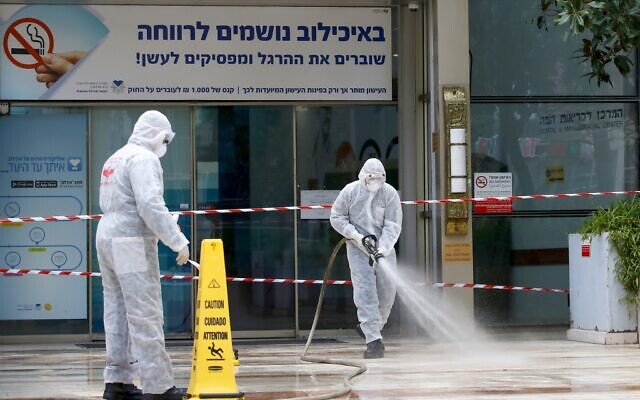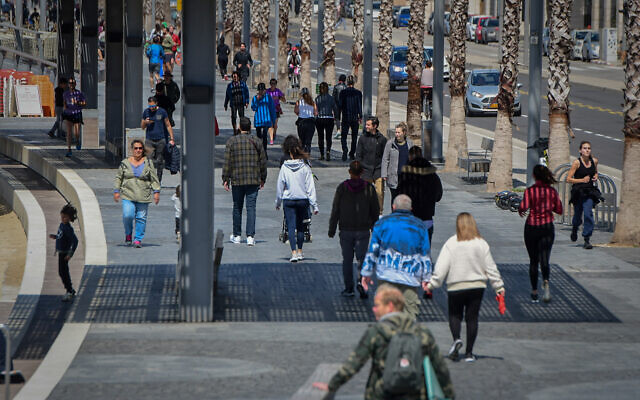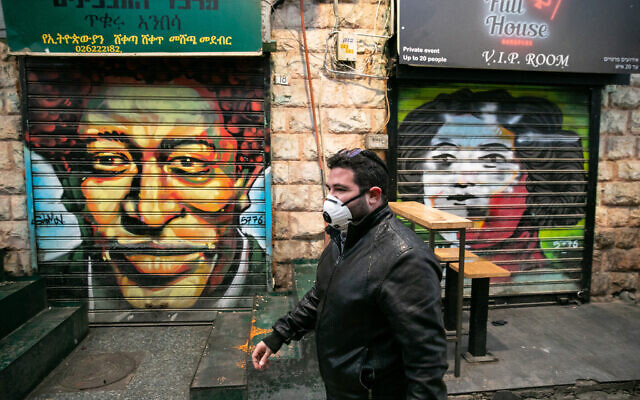Ministers update emergency regulations, which will be implemented at 8 a.m.; open-air markets to remain open for now; third minister quarantined after exposure to virus patient

Ministers late Saturday night updated the emergency regulations designed to contain the COVID-19 outbreak, which will come into effect on Sunday at 8 a.m. for seven days.
According to the rules, which the government has vowed to enforce, Israelis must remain at home, with exceptions made for buying essential food and medical supplies or seeking medical treatment. Other exceptions include attending demonstrations, aiding an elderly or ill, blood donations, attending court hearings, seeking aid from welfare services, going to the Knesset, and attending religious services, including weddings and funerals (which must have fewer than 10 people present) or visiting a ritual bath (mikvah).
Number of ill could pass 1,000
The number of Israelis diagnosed with coronavirus could soon rise by some 300 new cases, crossing the 1,000-patient mark, a Health Ministry official told Channel 12 news Saturday night. It was not immediately clear when the next Health Ministry update on the number of ill, currently at 883, would by publicized.
The network reported that while the latest update on Saturday morning had seen 178 new coronavirus cases, this figure was believed to be affected by that fact that testing was slowed down during Shabbat, with many laboratories closed for the weekend.
The unnamed official said it was “a scandal” that labs were working at reduced capacity during the weekend during an unprecedented national emergency.

The head of the Israel Association of Biochemists, Microbiologists and Laboratory Workers on Friday accused the Health Ministry of not allowing medical laboratories around Israel to operate at full capacity during Shabbat, limiting the number of coronavirus tests they can perform. The Health Ministry denied the claim, saying the labs were operating 24/7.
Saturday evening also saw Transportation Minister Bezalel Smotrich become the third cabinet minister to quarantine himself at home after coming into contact with someone who later tested positive for the COVID-19 disease. A statement from the minister said he would continue serving the public from home.
Smotrich joined five other lawmakers who have entered quarantine in recent days: Interior Minister Aryeh Deri (Shas), Regional Cooperation Minister Tzachi Hanegbi (Likud), Blue and White MKs Ram Ben-Barak and Alon Shuster and Shas MK Moshe Abutbul.
Netanyahu was to hold discussions over the evening with Health Ministry officials regarding the possibility of issuing more restrictive guidelines aimed at curbing the coronavirus outbreak after police reported large numbers of violators throughout the day, the Prime Minister’s Office said in a statement.
Throughout Saturday the Health Ministry urged the public to stay indoors despite the warm weather, amid reports that many Israelis had ventured outside while flouting directives. Videos showed police dispersing people in crowded locations such as Yarkon Park and the Tel Aviv promenade.

A police official told the Walla news site that officers would begin intensifying their enforcement against violators of Health Ministry guidelines. In the coming days, “there will be even more police on the streets dealing with crowds and penalizing businesses violating the guidelines,” the official said.
Half a million Israelis relegated to their homes have filed for unemployment benefits since the beginning of the month, according to a Welfare Ministry statement Saturday. On Friday the head of the country’s Employment Service said the number of unemployed people in Israel could reach one million if the coronavirus pandemic causes layoffs to continue at the current pace.
Health Ministry deputy director-general Itamar Grotto told Channel 12 news Saturday, “People will have to be in lockdown for an extended period of time. It’s not a matter of a day or two. We’re talking about at least two weeks as a first stage, and it could mean several months in the second stage.”
He added that infections throughout the country could yet reach 30-60 percent, “with the vast majority unaware that they are ill.”
As of Saturday evening there were 883 people diagnosed with coronavirus in Israel. The Health Ministry said 15 people were in serious condition, a day after the death of an 88-year-old man marked the country’s first fatality in the global pandemic. The ministry also said 19 people were listed in moderate condition and that the rest had mild symptoms.
The Health Ministry says it has boosted testing for the virus from some 500-700 tests a day to around 2,200 per day and officials have said the number of tests would increase to 3,000 per day by Sunday and 5,000 per day by the following week.

Israel confirmed its first death from the virus over the weekend. Aryeh Even, 88, was a resident of a senior home in Jerusalem and Holocaust survivor. Jerusalem’s Shaare Zedek Medical Center said he had been admitted in very serious condition with multiple preexisting conditions. Despite intensive treatment, including being resuscitated from heart failure, his state deteriorated rapidly and he died, the hospital said.
Even and an 89-year-old Jerusalem woman fighting for her life in Hadassah Hospital Ein Kerem were among several residents of the Nofim senior home in Jerusalem who were diagnosed with the virus.
The condition of several other Israelis deteriorated Friday, with a number of people in serious to critical condition.
Israel has taken far-reaching measures to contain the virus and on Friday the cabinet authorized further stringent workplace restrictions, tightening the limit to just 30% of workers in both public and private sectors in a bid to slow the spread of the coronavirus. The new workplace restrictions came hours after new emergency regulations legalizing tough personal restrictions on movement were approved by ministers early Friday. Ministers unanimously approved the measures, which made the limitations on movement announced earlier in the week legally binding and enforceable.
The disease generally only shows mild symptoms in the young and healthy, but can cause serious respiratory issues and death in older adults and those with underlying conditions.
As reported by The Times of Israel

